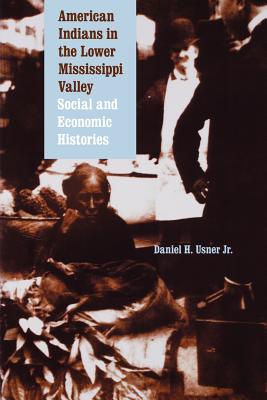

 University of Nebraska Press
University of Nebraska Press
American Indians in the Lower Mississippi Valley: Social and Economic Histories


Key Metrics
- Daniel H Usner
- University of Nebraska Press
- Paperback
- 9780803295636
- 9 X 6 X 0.52 inches
- 0.75 pounds
- Social Science > Ethnic Studies - American - Native American Studies
- English
 Secure Transaction
Secure TransactionBook Description
An introductory overview of the historiography of Native peoples in the early Southeast examines how the study of Native-colonial relations has changed over the last century. Daniel H. Usner Jr. reevaluates the Natchez Indians' ill-fated relations with the French and the cultural effects of Native population losses from disease and warfare during the eighteenth century. Usner next examines in detail the social and economic relations the Native peoples forged in the face of colonial domination and demographic decline, and he reveals how Natives adapted to the cotton economy, which displaced their familiar social and economic networks of interaction with outsiders. Finally, Usner offers an intriguing excursion into cultural criticism, assessing the effects of popular images of Natives from this region.
Author Bio
Daniel Usner is the author of Indians, Settlers, and Slaves in a Frontier Exchange Economy: The Lower Mississippi Valley before 1783 (University of North Carolina Press, 1992), which won the Jamestown Prize from the Omohundro Institute of Early American History and Culture and the John H. Dunning Prize from the American Historical Association. His other books are American Indians in the Lower Mississippi Valley: Social and Economic Histories (University of Nebraska Press, 1998), Indian Work: Language and Livelihood in American History (Harvard University Press, 2009), and Weaving Alliances with Other Women: Chitimacha Indian Work in the New South (University of Georgia Press, 2015), and American Indians in Early New Orleans: From Calumet to Raquette (Louisiana State University Press, 2018).
Usner has devoted much of his scholarship to imperial borderlands and Native homelands in early American history, focusing on intercultural exchange in colonial Louisiana and the Lower Mississippi Valley. His most recent work attends to the complicated relationship between the consumption of Indigenous culture and the production of Indigenous identity, attempting to rescue the intricacy of economic adaptations from ideological mis-representations of Native American livelihood.
Usner’s current book-length project explores how Native American women mobilized arts and crafts on behalf of their people’s sovereignty and territory, studying up-close the Chitimacha Indians of south Louisiana from the Civil War to the New Deal. This work spans a wide range of fields—particularly Native American history, women’s history, art history, material culture, and history of social science. Recent articles derived from this research are “From Bayou Teche to Fifth Avenue: Crafting a New Market for Chitimacha Indian Baskets,” Journal of Southern History 79 (May 2013), 339-74; "Weaving Material Objects and Political Alliances: The Chitimacha Indian Pursuit of Federal Recognition," Native American and Indigenous Studies 1 (Spring 2014), 25-48; and “’They Don’t Like Indian Around Here’: Chitimacha Struggles and Strategies for Survival in the Jim Crow South,” Native South 9(2016), 89-124.
Daniel Usner has received fellowships from the American Council of Learned Societies, the Cornell University Society for the Humanities, the Bard Graduate Center for Decorative Arts, Design History, and Material Culture, the Council for International Exchange of Scholars, the Huntington Library, the Newberry Library, the School for Advanced Research in Santa Fe, Vanderbilt University's Robert Penn Warren Center, and Vanderbilt University's Office of the Vice Provost for Research. Before joining the Vanderbilt faculty in 2002, Usner taught for two decades at Cornell University, where he received a Russell Distinguished Teaching Award and also served as Director of its American Indian Program in 1999-2002. He chaired Vanderbilt's history department from 2004 to 2007.
Usner has served on the councils of the American Society for Ethnohistory and the Omohundro Institute of Early American History and Culture. He was president of the American Society for Ethnohistory in 2010-11 and presently sits on the Southern Historical Association’s Executive Council and the Louisiana Historical Association’s Board of Directors. He has been selected to present the Walter Lynwood Fleming Lectures in Southern History at Louisiana State University in 2022.
Daniel Usner teaches graduate and undergraduate courses on American Indians since 1500, comparative imperial borderlands, North American colonies, the U.S. early republic, American Indian environmental history, and the history and culture of New Orleans.
Source: Vanderbilt University
Videos
No Videos
Community reviews
Write a ReviewNo Community reviews